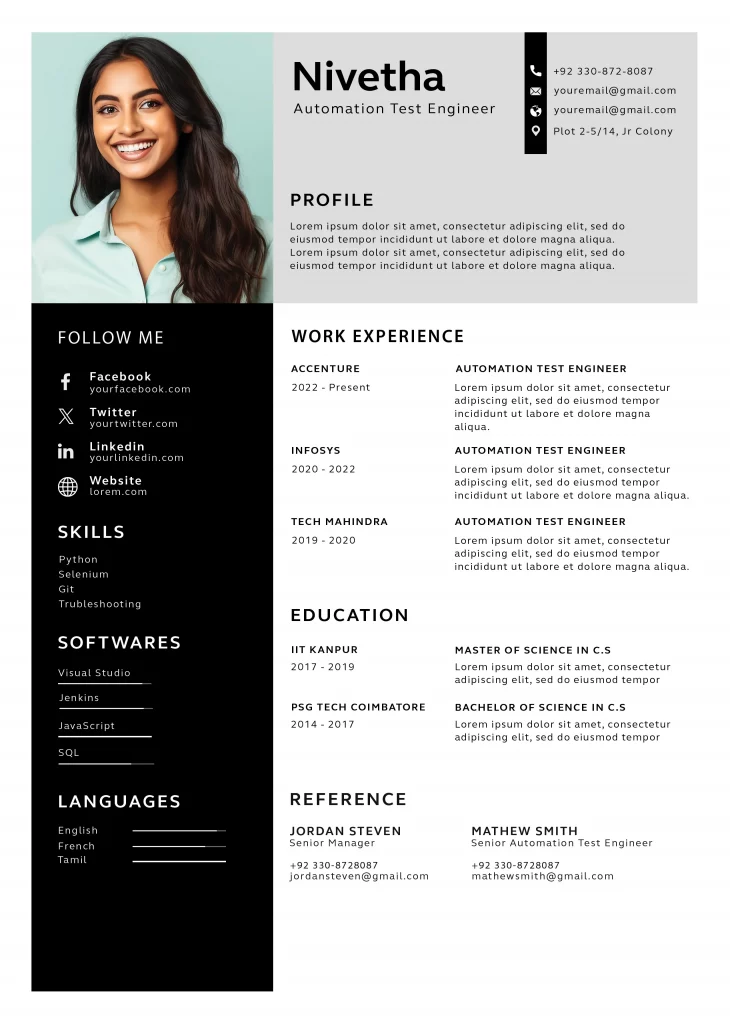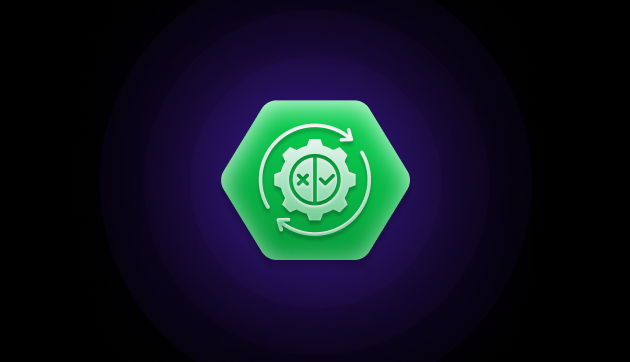
Automation Test Engineer Resume: 10 Important Things To Consider
Oct 24, 2024 4 Min Read 3072 Views
(Last Updated)
The world is moving towards automating the testing of products in order to increase work efficiency. Those who control the automation process will have a long career journey. In order to do that, all you need to have is a professional automation test engineer resume.
As you know, an automation test engineer is one who uses automated testing tools for product testing before deploying it in the real world. If you want to land that job role, prepare yourself a compelling automation test engineer resume.
But if you don’t know how to build one, worry not, we got you covered. In this article, you are going to learn how to build a professional automation test engineer resume that can open up the door of opportunities for you. We also included an example automation test engineer resume in order for you to gain a better understanding. So, read till the end.
Without further ado, let’s get started.
Table of contents
- Building a Professional Automation Test Engineer Resume
- Contact Information
- Summary or Objective
- Skills
- Professional Experience
- Achievements and Projects
- Soft Skills
- Education
- Certifications
- Professional Memberships
- Technical Proficiency
- Additional Sections (Optional):
- Example of a Professional Automation Test Engineer Resume
- Conclusion
- FAQ
- What should be the ideal length of an Automation Test Engineer resume?
- Should I include non-technical skills on my Automation Test Engineer resume?
- Is it necessary to tailor my resume for each job application?
- How do I effectively showcase my automation testing skills on my resume?
Building a Professional Automation Test Engineer Resume

When you are an automation test engineer, it is important to have a convincing automation test engineer resume to attract clients as well as employers. There are a lot of product-based companies that are in search of automation test engineers and if you have an apt automation test engineer resume, you will ace that.
This section holds the information to build a professional automation test engineer resume so read it till the last to gain insight into it.
Before we proceed further, it’s essential to have a solid foundation in automation testing principles and selenium basics. If you’re eager to dive deep into software testing, consider joining GUVI’s Selenium Automation Testing Course. In this program, you’ll learn the fundamentals of Selenium, Python, Java, Jenkins, Jmeter, API Testing, and more. Gain hands-on experience with industry-standard tools and techniques to get into a professional career focusing on the quality of Product & Process development.
Also, if you want to explore Automation Testing with Python through a Self-paced course, try GUVI’s Selenium Automation with Python certification course.
The things to be included in a professional automation test engineer resume are:
1. Contact Information
Always start your resume with your contact information as this is very crucial because employers will contact you with this only. Start with your full name, professional email address, and phone number. Include a LinkedIn profile if you have one. Ensure that your contact information is current and professional.
2. Summary or Objective
Tell about yourself in this section of your automation test engineer resume. Begin with a concise summary or objective statement that highlights your expertise and goals as an Automation Test Engineer. Mention your years of experience, key skills, and any specific achievements that set you apart.
3. Skills
Create a dedicated section to showcase your technical skills related to automation testing. Include automation testing tools (e.g., Selenium, Appium) and programming languages (e.g., Java, Python). Highlight any certifications you hold of these tools, such as ISTQB or other relevant certifications.
4. Professional Experience
Detail your work experience in reverse chronological order. Use bullet points to describe your responsibilities and achievements. Focus on how you contributed to automation testing, improved processes, and delivered quality software.
For each position, include:
- Job Title and Company: Clearly state your role and the company name.
- Duration: Specify the period you worked in each position.
- Responsibilities: Describe your key responsibilities and achievements. Highlight specific projects and their outcomes. For instance: “Led the automation of regression tests, resulting in a 30% reduction in testing time and a 20% improvement in overall software quality.”
5. Achievements and Projects
Highlight specific achievements and projects related to automation testing. Explain the challenges you faced, the strategies you implemented, and the impact on the overall testing process. Quantify your achievements where possible, using metrics like the percentage of test coverage improved or the reduction in the number of defects.
6. Soft Skills
Briefly touch on soft skills such as teamwork, communication, and problem-solving. These are crucial in a collaborative work environment. So make sure to add this to your automation test engineer resume.
7. Education
Include your educational background with the names of the institutions, degrees earned, and graduation dates. If you have relevant coursework or projects, mention them to showcase your academic expertise in testing and automation.
8. Certifications
It is important for you to acquire an automation test engineer certification from a professional organization in order to outstand the competitive crowd, for that, create a section in your automation test engineer resume to highlight these qualifications. Mention the certification name, issuing organization, and date of completion.
9. Professional Memberships
If you are a member of any professional organizations related to testing or automation, mention them. This indicates your engagement with the testing community and commitment to staying informed about industry best practices.
10. Technical Proficiency
Create a section to list the tools, frameworks, and technologies you are proficient in. This can include testing tools, version control systems, continuous integration tools, and any other relevant technologies.
11. Additional Sections (Optional):
Depending on your background and experiences, you can include additional sections such as languages spoken, memberships in professional organizations, or volunteer work, provided they enhance your qualifications.
Remember to tailor your resume to the specific job you’re applying for, emphasizing the skills and experiences most relevant to the position. Keep it concise, use action verbs, and update your achievements whenever possible to make your resume stand out.
Example of a Professional Automation Test Engineer Resume
It is now time for you to see it for yourself. We have imparted you with all the things that need to be there on an automation test engineer resume and hereby, we will attach an example resume that would help you understand it much better.

Enroll in GUVI’s Selenium Automation Testing Course to get your software testing career off to a great start. Here, you can master in-demand skills like Selenium, Python, Java, Jenkins, Jmeter, API Testing, and more.
Alternatively, if you want to explore Automation Testing with Python through a Self-paced course, try GUVI’s Selenium Automation with Python certification course.
Conclusion
In conclusion, a well-built Automation Test Engineer resume serves as a powerful gateway for you to navigate the dynamic world of software testing. Beyond being a mere list of skills and experiences, a standout automation test engineer resume is a narrative that highlights your proficiency, achievements, and commitment to ensuring the reliability and quality of software applications.
As the digital world continues to advance, the demand for skilled Automation Test Engineers is increasing, making a compelling resume not only a personal marketing tool but a key to unlocking opportunities in a competitive job market.
By showcasing a blend of technical knowledge, project successes, and a dedication to ongoing learning, an Automation Test Engineer’s resume becomes a roadmap for potential employers, guiding them toward a candidate who not only understands the intricacies of automated testing but also possesses the agility to adapt to the evolving needs of the industry.
Building such an automation test engineer resume is not just a formality; it’s a strategic effort to present yourself as an important asset in the world of software quality assurance.
Also Read: Is Choosing Automation Testing a Good Career Opportunity in 2023?
FAQ
What should be the ideal length of an Automation Test Engineer resume?
An ideal resume length is generally one to two pages. It should be concise, focusing on relevant skills and experiences.
Should I include non-technical skills on my Automation Test Engineer resume?
Yes, includes soft skills like communication, teamwork, and problem-solving. These are crucial in a collaborative work environment.
Is it necessary to tailor my resume for each job application?
Yes, tailor your resume for each application by emphasizing the skills and experiences most relevant to the specific job description.
How do I effectively showcase my automation testing skills on my resume?
Create a dedicated “Skills” section, listing tools, programming languages, and testing frameworks you are proficient in. Provide specific examples in your work experience section.















Did you enjoy this article?